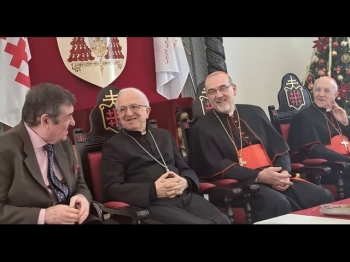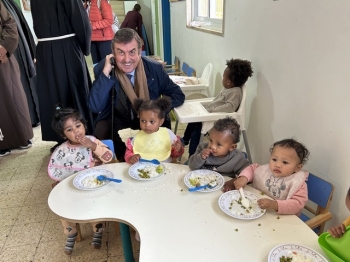Not just Gaza

Returning from the Holy Land where the Grand Master and the Governor General presented the donations of about one million euros that the Knights and Dames have sent for the ongoing emergency, Governor General Visconti di Modrone tells how aid is needed not only in Gaza - where it cannot be sent for now - but also in the West Bank where the Order, working alongside the Patriarchate, is supporting the population suffering the economic and social consequences of the war.
I cannot help but share with my brethren around the world the deep impressions my recent pilgrimage with the Grand Master to the Holy Land at the turn of the year made. It was a pilgrimage unlike any other. The tension of yesteryear in the Holy Places between Israelis and Palestinians had turned into today's war. At such a time in the absence of pilgrimages, it was onerous upon us to give the Patriarchate a sign of closeness.
Nonetheless, the emotions we experienced were dramatic: The Holy City is empty. At the Basilica of the Holy Sepulchre, the Franciscan friars welcomed us with joy and offered us hot chocolate and some cookies after the Holy Rite celebrated in front of the Tomb of the Risen One, and they happily explained the restoration work under way to us.
As we walked the entire length of the Via Dolorosa from the Lion's Gate toward the Holy Sepulchre, we only encountered a nun returning to the Church of St. Veronica and a Franciscan who hastened to solicit our presence at the procession to be held in the afternoon. The Church of St. Anne was deserted, where a lazy janitor did not have the courage to ask for payment of the ticket, the Museum of the Flagellation was closed, the Ecce Homo arch abandoned. The first nine Stations, marked on the way, but whose small plaques I had missed in the past, distracted by the cheerful hubbub and confusion of the passage, were a quiet place to stop and pray. At the Museum of the Holy Land, a kind nun opened the rooms housing the artefacts by turning on the lights for us.
Stores and restaurants are closed: It was difficult to find a way to bring a souvenir back home. The only one found open did not even give me the satisfaction of the traditional pretence of price negotiations. At the American Colony, the large dining room with a fireplace lit for only one other table where four elegant ladies,’ likely consorts of foreign diplomats, sat.
At Notre Dame there were few people, but a conspicuous sign on the door of the store indicated that it was closed. Few patrons at the restaurant, perhaps the only one open in town for New Year's Eve. Jaffa Gate, the transit point from which the roads leading to the Armenian quarter and the Ancient Roman Cardo to the Omar Mosque branch off, were literally deserted. Nice to be able to pray silently and at length over the Holy Places, but sad to know that the reason for this absence of pilgrims is war.
Only outside the historic walls of the Old City does Jerusalem seem to maintain a semblance of normalcy even if the traffic does not resemble that of years past. In people's comments, it is believed that Jerusalem is less affected by Hamas rockets because it is inhabited by many Palestinians and farther away; better to target Tel Aviv because it is closer and because it is more "Israeli." On Sunday, January 7, 27 rockets were fired at Tel Aviv. They avoid Jerusalem because 1/3 of Jerusalem's population is Palestinian. They hit Tel Aviv more where the population is more Israeli. But still even here many people tell first-hand of seeing Hamas rockets flying over the city and being intercepted before hitting the target.




